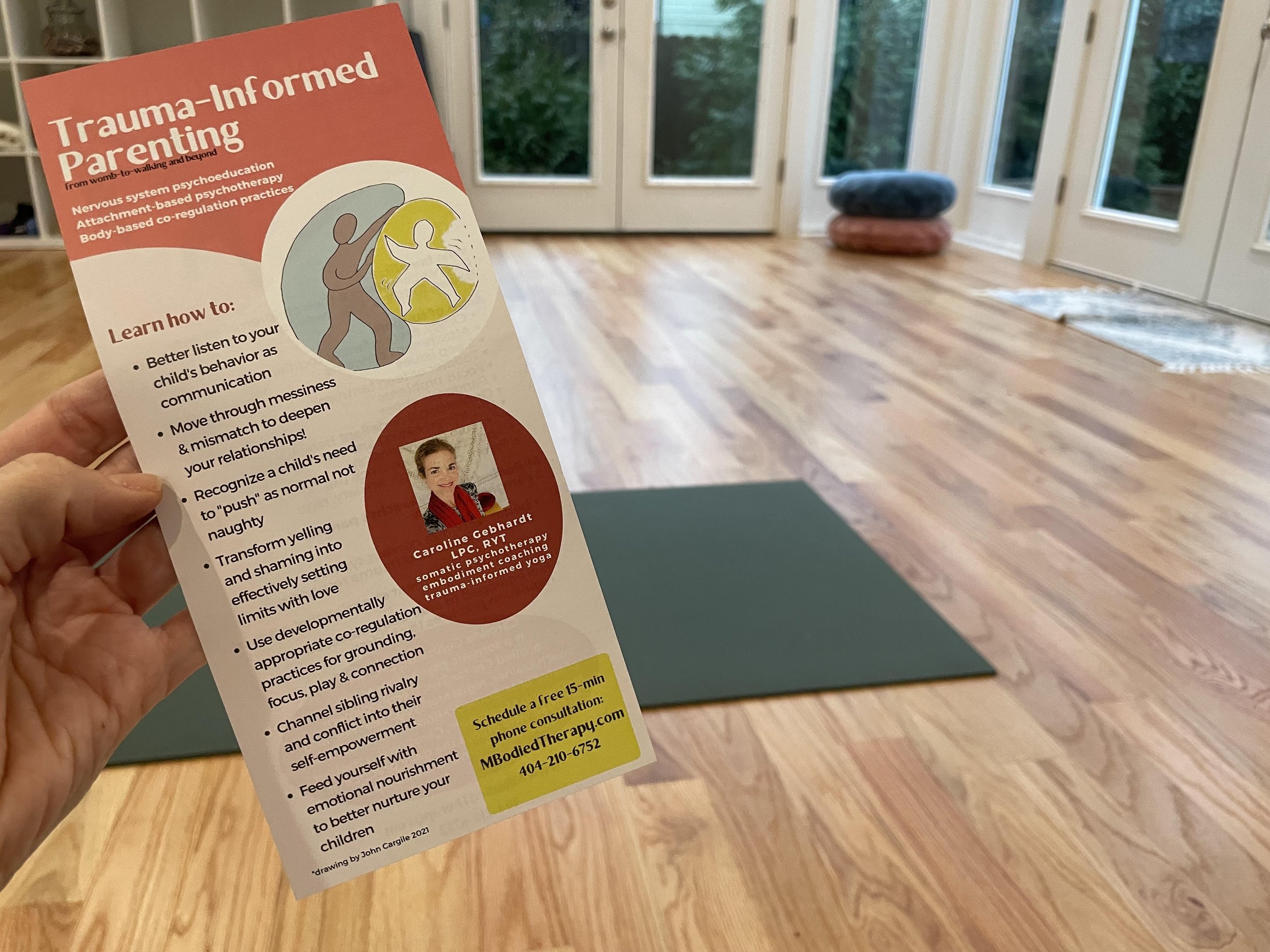
Trauma-Informed Parenting
Trauma-informed parenting and family therapy for parents, caregivers and their children of all ages using a blend of somatic and cognitive therapy techniques for co-regulation
No one gets what is ideal. However, when we have somatic knowing of what is ideal, we become who we would have become if we had gotten what is ideal.
- Dee Wagner, originator of Chi for Two®
Motherhood: Birthing Yourself
Before and after having a baby can be a whirlwind. So, how do you nourish yourself while nourishing others? How do you tend to that part of you that needs just as much attention as other loved ones in your family when growing your family?
Whether you are a parent-to-be (biological or adoptive), are experiencing baby loss, are trying to conceive or adopt, or are a parent with a colicky baby (plus toddler!), therapy can be a part of your support system.
From the anticipation of family planning and pregnancy and post-birth “baby blues,” to possible anxiety/depression, to physical recovery, and the list goes on—they all need support and tender care through psychotherapy, social support and sometimes other resources—and this applies to all parents or caregivers, biological or adoptive, regardless of sex or gender.
Toddlers to Teens: Messiness, Mismatch, Tantrums and Ruptures
Toddlers and teens leaving you a little lost or frustrated? Do you say go left, but they only want to go right? Is their favorite word NO, or are their chronic eye-rolls triggering your own backlash or retreat? Or, perhaps there are explosions everyday along with defiant behavior, constant opposition and a general lack of disconnection or even fear for their well-being.
Understanding attachment as a practice and how co-regulation supports healthy brain development for each unique child helps families to learn and integrate body-based techniques that help them to consciously and more easily move-through-the-messy.
Parents can also become more capable of becoming curious about and honoring the ruptures, friction and messiness that inevitably happen!
Family Therapy: Many Hands Make Light Work
Families come in all shapes and sizes, and like individuals, have their own strengths, weaknesses and blind spots. Sometimes these show up as communication problems, chronic bickering, boundary issues, behavioral problems, eating disorders or substance abuse, school or learning challenges, job transitions, grief and loss, to name a few. Or, sometimes it might seem like there’s one person with the problem.
Inviting all members of the family into therapy can help shine light on areas that could use attention for the benefit of everyone, hence the saying many hands make light work. While all members are invited to be courageous, to invest in the therapeutic process, the process of reconnecting together offers deep emotional nourishment, practical take-home practices, and nervous system re-patterning that benefit the whole family.
Who Benefits from Trauma-Informed Parenting & Family Therapy?
Parents & their children of all ages: Babies, toddlers, kids, tweens, teens & adult children
Areas of support:
Clingy, fussy baby
Attachment concerns
Sleep issues
Toddler or teen tantrums
Focus problems
Neurodivergence
Oppositional or defiant behavior
Disordered eating and self harm
Chronic family tension
Addiction or substance use
Parent depression, anxiety, rage
M-Bodied Therapy teaches parents and caregivers how to:
better recognize nervous system, developmental, and trauma responses,
appreciate attachment as an ongoing practice, and
feel equipped to offer co-regulation to children.
“I would rather be the child of a mother who has all the inner conflicts of the human being than be mothered by someone for whom all is easy and smooth, who knows all the answers, and is a stranger to doubt.”
~ Donald W. Winnicott

“You are born to one mother, but if you are lucky, you will have more than one. And among them all you will find most of what you need....Your relationships with todas las madres, the many mothers, will most likely be ongoing ones, for the need for guidance and advisory is never outgrown.”
— Clarissa Pinkola Estés , Women Who Run with the Wolves







